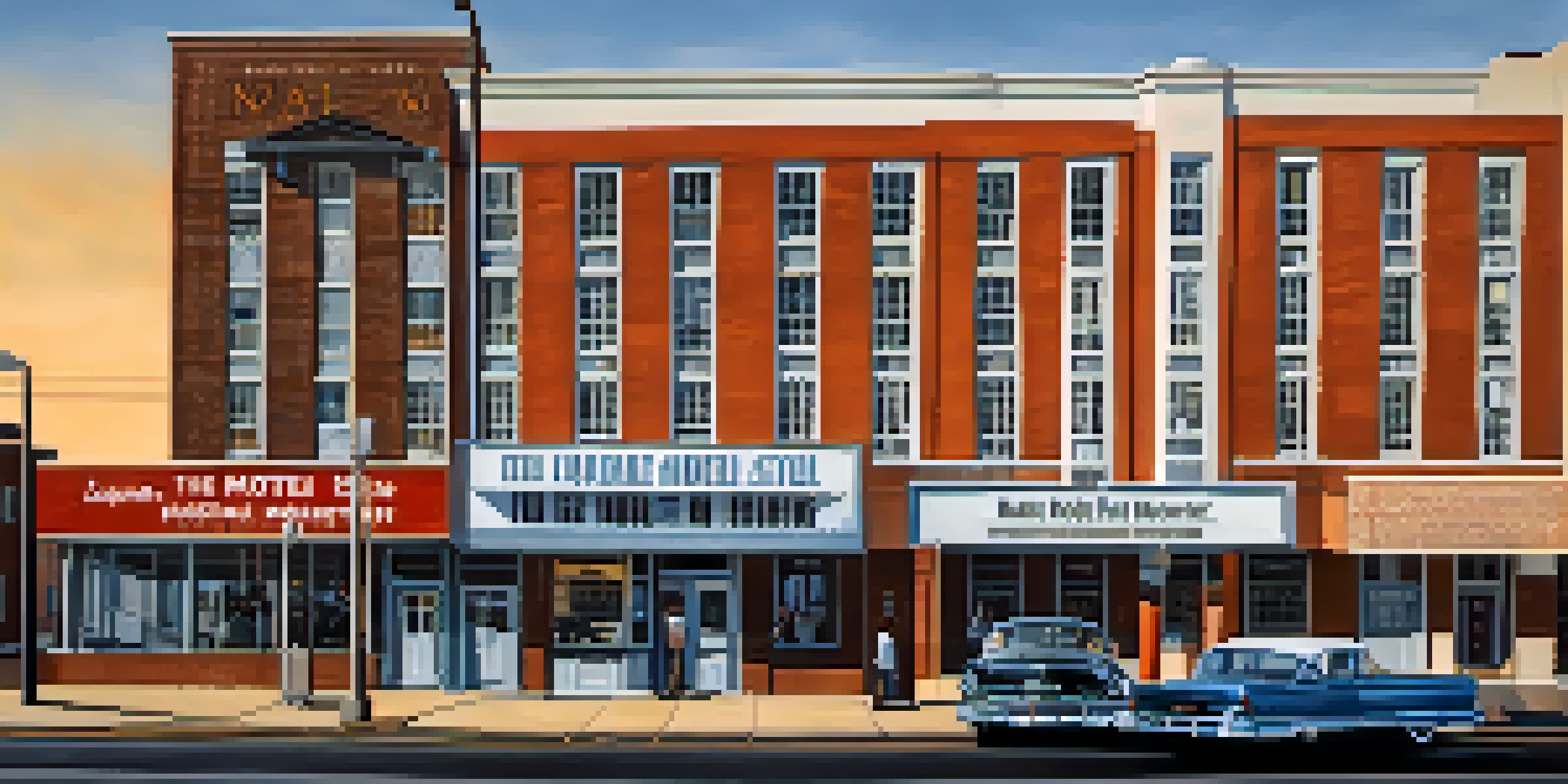Understanding Civil Rights Through Memphis Landmarks

The Legacy of the National Civil Rights Museum
Located at the Lorraine Motel, the National Civil Rights Museum is a pivotal site that chronicles the history of the civil rights movement in America. It commemorates key events and figures, including Dr. Martin Luther King Jr., who was assassinated here in 1968. Visitors can engage with powerful exhibits that showcase the struggles and triumphs of the movement, making it an essential stop for anyone wanting to understand civil rights.
Injustice anywhere is a threat to justice everywhere.
Walking through the museum, you’ll find interactive displays and poignant narratives that bring the past to life. For many, it becomes a place of reflection, helping them grasp the ongoing fight for equality. The museum's location itself serves as a reminder of the sacrifices made by countless individuals in the pursuit of justice.
Moreover, the National Civil Rights Museum not only honors history but also encourages dialogue about contemporary issues. By connecting the past to the present, it invites visitors to consider their role in advocating for civil rights today, ensuring that the lessons learned are not forgotten.
The Significance of the Slave Haven Underground Railroad Museum
The Slave Haven Underground Railroad Museum offers a unique glimpse into the history of slavery and the Underground Railroad. Housed in the former home of a conductor, this landmark highlights the perilous journeys many enslaved individuals undertook to seek freedom. It serves as a testament to the bravery of those who risked everything for liberty and the allies who supported them.

As you explore the museum, you’ll uncover stories of escape, resilience, and hope. The preserved spaces, including a hidden tunnel, create an immersive experience that connects visitors to the past. This historical context is crucial for understanding the roots of civil rights and the ongoing fight against systemic oppression.
Civil Rights Museum's Impact
The National Civil Rights Museum serves as a powerful reminder of the struggles for equality and encourages ongoing dialogue about civil rights today.
By visiting the Slave Haven Museum, one can appreciate the deep scars of history while recognizing the strength of community solidarity. It emphasizes that the struggle for justice and equality didn’t end with the abolition of slavery but continues to this day, reminding us of our collective responsibility.
The Role of Beale Street in African American Culture
Beale Street is often celebrated as the heart of Memphis music, but its significance runs deeper as a cultural hub for African Americans. Historically, it served as a gathering place for artists, musicians, and activists, fostering a vibrant community that contributed to the civil rights movement. The street's lively atmosphere invites both locals and tourists to explore its rich heritage.
The time is always right to do what is right.
Throughout the decades, Beale Street has been a platform for social change, where music and activism intersected. Iconic venues like the Orpheum Theatre and various blues clubs have hosted performances that spoke to the struggles and aspirations of African Americans. The sounds of blues, soul, and jazz echo the resilience of a community determined to overcome adversity.
Today, Beale Street remains a symbol of pride and cultural expression. It reminds us that music is not just entertainment; it serves as a powerful tool for social commentary and unity. By visiting this landmark, you can experience firsthand how art has historically played a pivotal role in the fight for civil rights.
The Impact of the Memphis Freedom Trail
The Memphis Freedom Trail is a self-guided path that connects key sites related to the civil rights movement in the city. Spanning several important locations, the trail tells the story of the struggle for equality through historical markers and informative plaques. It’s a unique way to experience Memphis while learning about the significant events that shaped the civil rights landscape.
As you walk the trail, you’ll encounter landmarks like the former site of the Woolworth's lunch counter, where sit-ins took place during the civil rights protests. Each stop along the trail is a reminder of the courage displayed by those who fought for justice. The journey encourages visitors to engage with the past and reflect on its implications for the present.
Significance of Beale Street
Beale Street is not only a cultural hub for music but also a historical site where art and activism intersected during the civil rights movement.
Moreover, the Memphis Freedom Trail emphasizes the importance of grassroots activism. It shows that change often starts at the community level, reminding us that everyone has a role to play in the ongoing fight for civil rights. By exploring the trail, you not only gain knowledge but also become part of a larger narrative of resilience and hope.
Remembering the Impact of the Cotton Club
The Cotton Club, once a prominent venue for African American entertainers during the Jim Crow era, played a significant role in shaping the cultural landscape of Memphis. It was a space where artists could showcase their talents despite the racial segregation prevalent at the time. The club's legacy is a reminder of the artistic contributions that emerged even in the face of adversity.
Though the original Cotton Club is no longer in operation, its influence is felt throughout the city. It served as a launching pad for many legendary musicians, including B.B. King and Louis Armstrong. The club was more than just a music venue; it was a gathering place for the African American community, fostering solidarity and cultural pride.
Today, the Cotton Club’s history inspires new generations of artists and activists. By remembering its significance, we honor the legacy of those who fought against oppression through their art. The club stands as a testament to the power of creativity in challenging societal norms and advocating for change.
The Importance of the Civil Rights Memorial
The Civil Rights Memorial in Memphis serves as a poignant tribute to the individuals who lost their lives in the struggle for civil rights. This powerful monument honors the sacrifices made by activists and highlights the ongoing fight against injustice. It stands as a reminder of the cost of freedom and the importance of remembering those who paved the way for future generations.
Visitors to the memorial can reflect on the names inscribed on its surface, each representing a life cut short in the pursuit of equality. The memorial encourages discussions about the struggles faced by marginalized communities, emphasizing that the fight for justice is far from over. It serves as a call to action for all of us to continue advocating for civil rights.
Memphis Freedom Trail's Legacy
The Memphis Freedom Trail connects key civil rights landmarks, highlighting the importance of grassroots activism in the ongoing fight for equality.
By engaging with the Civil Rights Memorial, we gain a deeper understanding of the past while recognizing our responsibility to shape a more equitable future. It reinforces the message that every individual can contribute to the ongoing movement for justice, making it a crucial stop on any exploration of Memphis landmarks.
Exploring the Legacy of the Mississippi River
The Mississippi River has long been a significant geographical and cultural landmark for the African American community in Memphis. It served as both a literal and metaphorical pathway for those escaping enslavement, connecting communities across state lines. The river's history is intertwined with the civil rights struggle, making it a vital part of the narrative.
As you stand by the riverbank, you can imagine the countless individuals who traversed its waters in search of freedom. The river symbolizes resilience, as it has witnessed both the struggles and triumphs of the African American community. It reminds us that the fight for civil rights is not confined to urban spaces but extends across landscapes and waterways.

Today, the Mississippi River continues to inspire artistic expression and activism. Many artists and leaders draw upon its rich history to advocate for social justice. By exploring this landmark, we connect with the broader themes of freedom and equality that resonate within the civil rights movement.
Reflecting on Memphis's Role in the Civil Rights Movement
Memphis holds a unique place in the civil rights narrative, serving as a backdrop for pivotal events and figures. The city's history is marked by both struggle and resilience, showcasing the complexities of the fight for equality. By examining Memphis's role in the movement, we gain insights into the broader context of social justice in America.
Through landmarks, museums, and memorials, visitors can engage with the stories of those who fought for change. Each site contributes to a collective memory that reminds us of the sacrifices made for civil rights. It is essential to acknowledge these narratives to understand the ongoing challenges faced by marginalized communities today.
Ultimately, reflecting on Memphis's contributions to the civil rights movement encourages us to continue the work of those who came before us. It inspires a sense of responsibility to advocate for justice and equality in our communities. By learning from the past, we can build a future that honors the values of civil rights for all.